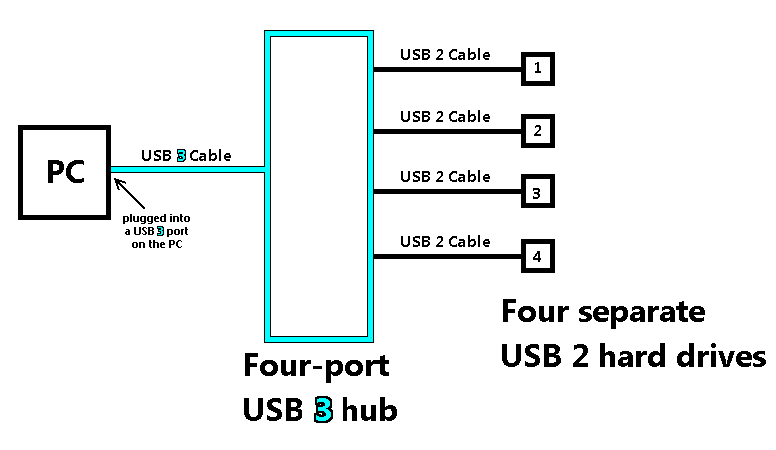Suppose I have a fully compliant 4 port USB 3.0 hub plugged into a USB 3.0 port on my computer. The system is therefore capable of a bandwidth of 5 Gbps.
My question is this: If I fill all 4 ports with USB 2.0 devices, are they all able to operate at the full USB 2.0 speed at the same time (4 lots of 480 Mbps each i.e. 1.92 Gbps in total) or does the hub need to serve those devices in some sort of "legacy mode" which limits the total throughput to 480 Mbps instead? Thanks.
----------
EDIT. For anyone stumbling across this page from a search engine in the future, this Superuser thread has the answer:
https://superuser.com/questions/590668/understanding-power-and-data-bandwidth-when-using-usb-2-0-devices-on-a-usb-3-0-c
The four USB 2.0 devices will need to share a total of 480 Mbps between them, even if connected to a USB 3.0 hub. They will not be able to operate concurrently at full speed. Instead, they will only have one-quarter of the maximum USB 2.0 bandwidth available to them. This is because, effectively, a "USB 3 hub" is actually two dedicated hubs in one box -- one for USB 2.0 data and another for USB 3.0 data.
Here is a diagram of the hypothetical situation. Despite all being connected to a USB 3.0 hub (which is connected via a USB 3.0 cable to a compatible PC), the four hard drives must share the bandwidth of a single USB 2.0 link.

My question is this: If I fill all 4 ports with USB 2.0 devices, are they all able to operate at the full USB 2.0 speed at the same time (4 lots of 480 Mbps each i.e. 1.92 Gbps in total) or does the hub need to serve those devices in some sort of "legacy mode" which limits the total throughput to 480 Mbps instead? Thanks.
----------
EDIT. For anyone stumbling across this page from a search engine in the future, this Superuser thread has the answer:
https://superuser.com/questions/590668/understanding-power-and-data-bandwidth-when-using-usb-2-0-devices-on-a-usb-3-0-c
The four USB 2.0 devices will need to share a total of 480 Mbps between them, even if connected to a USB 3.0 hub. They will not be able to operate concurrently at full speed. Instead, they will only have one-quarter of the maximum USB 2.0 bandwidth available to them. This is because, effectively, a "USB 3 hub" is actually two dedicated hubs in one box -- one for USB 2.0 data and another for USB 3.0 data.
Here is a diagram of the hypothetical situation. Despite all being connected to a USB 3.0 hub (which is connected via a USB 3.0 cable to a compatible PC), the four hard drives must share the bandwidth of a single USB 2.0 link.


